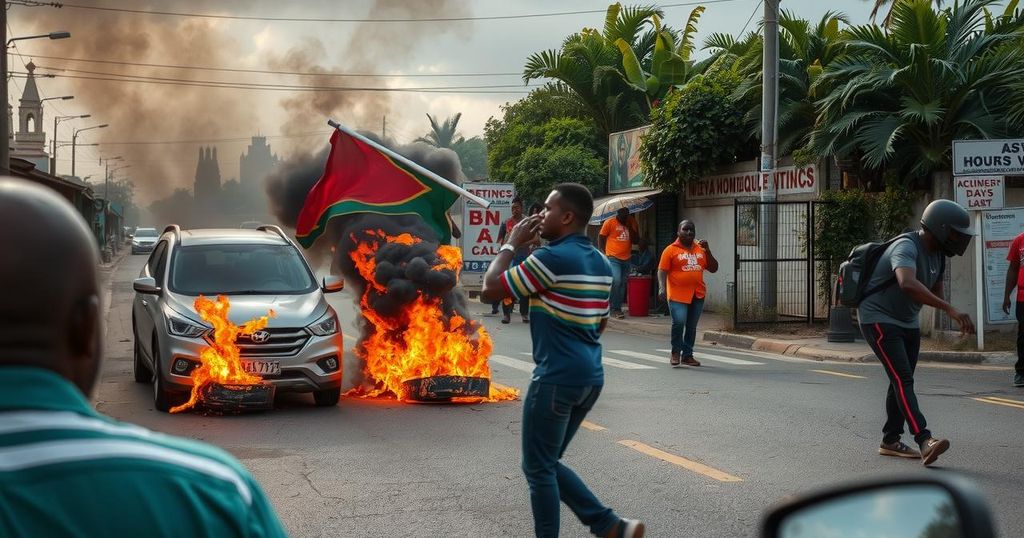Post-Election Violence Disrupts Mozambique’s Major Cities Amid Unrest
Mozambique’s cities are paralyzed by post-election unrest following a disputed election outcome favoring the ruling Frelimo party. Protests have led to looting, vandalism, and a rising death toll, with tensions escalating between opposition groups and police. The international community, including the UN, has called for dialogue to address the growing crisis.
Major cities across Mozambique experienced significant disruptions on Friday due to escalating post-election violence. The capital, Maputo, along with its suburb Matola, saw an absence of crucial commercial activity as opposition-led protests resulted in extensive looting and vandalism. The unrest follows the Constitutional Council’s confirmation of the ruling Frelimo party’s victory in the contentious presidential election, which extended its rule into a 50th year. The court stated that Frelimo’s candidate, Daniel Chapo, received 65% of the vote, down from an earlier claim of nearly 71%. This has intensified feelings of anger and frustration among opposition supporters, culminating in protests that frequently escalated into violent encounters with law enforcement.
Witness accounts from Maputo depict scenes of chaos where protesters engaged in looting, entering local businesses to seize merchandise, and igniting fires. A resident shared, “The people I saw ran away and broke glass. I saw everything that was happening. They took microwaves, televisions, beds. This should not happen because they are ruining many things, and they cannot behave like this,” highlighting the distress and dismay felt by locals. The unrest has tragically resulted in numerous deaths, including at least 11 individuals who perished in a warehouse fire during the violence.
Amid these tensions, police chief Bernardino Rafael labeled the looters as criminals, stating that an organized assault on industrial complexes and storage facilities has compromised public safety. In contrast, opposition leader Venancio Mondlane attributed the violence to police actions, calling for his supporters to protest peacefully without resorting to further looting. He stated, “It’s the police men who are prepared to rob the stores, set fire to the banks, break into the warehouses.”
The situation has reached alarming levels, with reports indicating that at least 248 individuals have died due to the protests, while a massive prison break on December 25 allowed approximately 1,500 inmates to escape. The United Nations has also voiced concern, with Secretary-General Antonio Guterres urging for dialogue and non-violent resolutions to restore order in Mozambique. This ongoing crisis emphasizes the urgent need for economic stability and governance reforms amid a socio-political landscape fraught with instability and unrest.
The backdrop to the current unrest in Mozambique is the recent presidential election that occurred in October 2024, which saw the ruling Frelimo party secure another term amidst allegations of electoral fraud and corruption. The party has been in power since Mozambique’s independence in 1975, leading to growing discontent, particularly among opposition factions. The recent confirmation of election results by the Constitutional Council has ignited protests, highlighting longstanding grievances related to governance, economic disparity, and political representation within the country. The violent response from both the public and police has destabilized numerous urban areas, intensifying fears of further escalation if political dialogue does not take place.
In summary, the post-election unrest in Mozambique has led to severe disruption in major cities, characterized by protests, looting, and violent confrontations with police. The current climate reflects deep-seated frustrations regarding governance and democratic processes within the country. The detraction of businesses and the tragic loss of lives call for immediate attention from both local authorities and international bodies to foster constructive dialogue and mitigate ongoing tensions. Without substantial efforts from all stakeholders, the risk of continued violence remains high, posing a significant threat to Mozambique’s future stability.
Original Source: www.dw.com




Post Comment